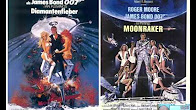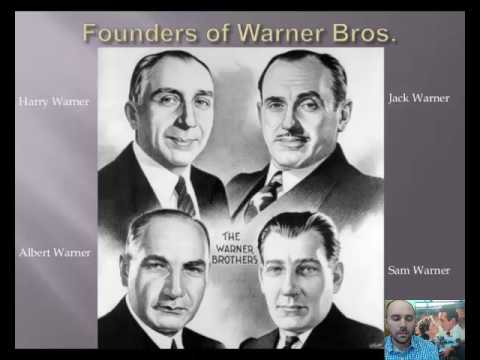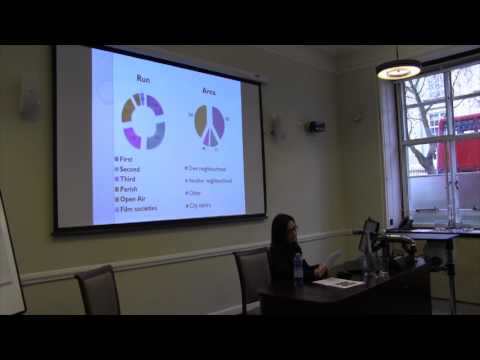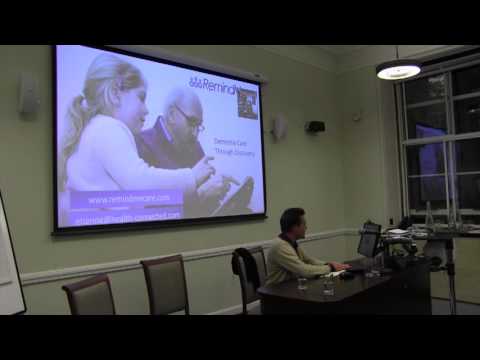1. Clicking ▼&► to (un)fold the tree menu may facilitate locating what you want to find. 2. Videos embedded here do not necessarily represent my viewpoints or preferences. 3. This is just one of my several websites. Please click the category-tags below these two lines to go to each independent website.
Showing posts with label A. (subjects)-Humanities-Performing Arts-Movie/Theater-~. Show all posts
Showing posts with label A. (subjects)-Humanities-Performing Arts-Movie/Theater-~. Show all posts
2017-08-24
Alain Badiou: Cinema and Philosophy
source: UNSW Arts & Social Sciences 2015年2月17日
Alain Badiou has been writing on cinema for over fifty years. This talk addresses several of the key ideas which animate his decidedly philosophical engagement with what he calls 'the impure art of cinema,' an engagement oriented by the simple axiom: cinema thinks.
Part of UNSW Arts & Social Sciences 'So, What? Lecture Series'.
https://www.arts.unsw.edu.au/about-us...
2017-07-20
Matt Alberhasky (videos of June 2017)
source: Matt Alberhasky
 23:20 Blockbuster Era Lecture Lecture on Hollywood in Blockbuster Era 1980 to early 2000
23:20 Blockbuster Era Lecture Lecture on Hollywood in Blockbuster Era 1980 to early 2000
 31:06 Hollywood Renaissance Lecture Lecture on Hollywood Renaissance 1967-1980
31:06 Hollywood Renaissance Lecture Lecture on Hollywood Renaissance 1967-1980
 21:46 Late Studio Lecture Lecture over the late Hollywood
21:46 Late Studio Lecture Lecture over the late Hollywood
 24:33 Sound Transition to War Boom2 Lecture on Hollywood's Transition to Sound through the War Boom; 1927-1946
24:33 Sound Transition to War Boom2 Lecture on Hollywood's Transition to Sound through the War Boom; 1927-1946
 23:20 Blockbuster Era Lecture Lecture on Hollywood in Blockbuster Era 1980 to early 2000
23:20 Blockbuster Era Lecture Lecture on Hollywood in Blockbuster Era 1980 to early 2000  31:06 Hollywood Renaissance Lecture Lecture on Hollywood Renaissance 1967-1980
31:06 Hollywood Renaissance Lecture Lecture on Hollywood Renaissance 1967-1980  21:46 Late Studio Lecture Lecture over the late Hollywood
21:46 Late Studio Lecture Lecture over the late Hollywood 24:33 Sound Transition to War Boom2 Lecture on Hollywood's Transition to Sound through the War Boom; 1927-1946
24:33 Sound Transition to War Boom2 Lecture on Hollywood's Transition to Sound through the War Boom; 1927-1946
2017-06-10
Matt Alberhasky (videos of May 2017)
source: Matt Alberhasky
 24:00 Golden Age Lecture Lecture on Hollywood's Golden Age 1930s
24:00 Golden Age Lecture Lecture on Hollywood's Golden Age 1930s
 14:20 Silent Era Lecture Silent film era
14:20 Silent Era Lecture Silent film era
 24:00 Golden Age Lecture Lecture on Hollywood's Golden Age 1930s
24:00 Golden Age Lecture Lecture on Hollywood's Golden Age 1930s  14:20 Silent Era Lecture Silent film era
14:20 Silent Era Lecture Silent film era
2017-01-20
Cinema and Memory (18-11-16)
source: SchAdvStudy
 22:01 Care Home as Cinematic Connectivity: Enhancing Social Connectivity through Film Care Home as Cinematic Community: Enhancing Social Connectivity through Film / Ana Salzberg (Dundee)
22:01 Care Home as Cinematic Connectivity: Enhancing Social Connectivity through Film Care Home as Cinematic Community: Enhancing Social Connectivity through Film / Ana Salzberg (Dundee)
 20:43 iPads and Cake: Supported Conversations Katharine Ford
20:43 iPads and Cake: Supported Conversations Katharine Ford
 25:20 Publicness, Ritual and Outdoor Cinema in Thailand Publicness, Ritual and Outdoor Cinema in Thailand / Richard MacDonald (Goldsmiths)
25:20 Publicness, Ritual and Outdoor Cinema in Thailand Publicness, Ritual and Outdoor Cinema in Thailand / Richard MacDonald (Goldsmiths)
 21:53 The Working Class of Parisian Inter-War Cinemas The Local Cinema as Place Publique: The Working Class of Parisian Inter-War Cinemas / Annie Fee (UCL)
21:53 The Working Class of Parisian Inter-War Cinemas The Local Cinema as Place Publique: The Working Class of Parisian Inter-War Cinemas / Annie Fee (UCL)
 1:24:41 Engaging with Memories of Cinema-going in Post-War Italy Engaging with Memories of Cinema-going in Post-War Italy
1:24:41 Engaging with Memories of Cinema-going in Post-War Italy Engaging with Memories of Cinema-going in Post-War Italy
Cinema and Memory
18-11-16 Institute of Modern Languages Research http://www.sas.ac.uk/
Institute: https://modernlanguages.sas.ac.uk
 23:00 The Prison Memory Archive project Cahal McLaughlin (Queen's University Belfast)
23:00 The Prison Memory Archive project Cahal McLaughlin (Queen's University Belfast)
 15:07 The Power of Memories Etienne Abrahams (Co-Founder and CTO, Health-Connected)
15:07 The Power of Memories Etienne Abrahams (Co-Founder and CTO, Health-Connected)
18-11-16 Institute of Modern Languages Research http://www.sas.ac.uk/
Institute: https://modernlanguages.sas.ac.uk
 23:00 The Prison Memory Archive project Cahal McLaughlin (Queen's University Belfast)
23:00 The Prison Memory Archive project Cahal McLaughlin (Queen's University Belfast) 15:07 The Power of Memories Etienne Abrahams (Co-Founder and CTO, Health-Connected)
15:07 The Power of Memories Etienne Abrahams (Co-Founder and CTO, Health-Connected) 22:01 Care Home as Cinematic Connectivity: Enhancing Social Connectivity through Film Care Home as Cinematic Community: Enhancing Social Connectivity through Film / Ana Salzberg (Dundee)
22:01 Care Home as Cinematic Connectivity: Enhancing Social Connectivity through Film Care Home as Cinematic Community: Enhancing Social Connectivity through Film / Ana Salzberg (Dundee) 20:43 iPads and Cake: Supported Conversations Katharine Ford
20:43 iPads and Cake: Supported Conversations Katharine Ford
(The Cinema Museum - The Gentleman's Cake Club)
 25:20 Publicness, Ritual and Outdoor Cinema in Thailand Publicness, Ritual and Outdoor Cinema in Thailand / Richard MacDonald (Goldsmiths)
25:20 Publicness, Ritual and Outdoor Cinema in Thailand Publicness, Ritual and Outdoor Cinema in Thailand / Richard MacDonald (Goldsmiths) 21:53 The Working Class of Parisian Inter-War Cinemas The Local Cinema as Place Publique: The Working Class of Parisian Inter-War Cinemas / Annie Fee (UCL)
21:53 The Working Class of Parisian Inter-War Cinemas The Local Cinema as Place Publique: The Working Class of Parisian Inter-War Cinemas / Annie Fee (UCL) 1:24:41 Engaging with Memories of Cinema-going in Post-War Italy Engaging with Memories of Cinema-going in Post-War Italy
1:24:41 Engaging with Memories of Cinema-going in Post-War Italy Engaging with Memories of Cinema-going in Post-War Italy
AHRC -funded Italian Cinema Audiences collaborative project presentation
Daniela Treveri Gennari (Oxford Brookes)
Silvia Dibeltulo (Oxford Brookes)
Sarah Culhane (University of Bristol)
http://www.italiancinemaaudiences.org/
2016-12-29
Jon Beasley-Murray: Francis Ford Coppola, Apocalypse Now (02/04/2014)
source: Arts One Open 2014年4月2日
Lecture by Jon Beasley-Murray for the "Remake/Remodel" theme. For more, see http://artsone-open.arts.ubc.ca/franc....
As part of this lecture, the following clips from the film, available on YouTube, are discussed:
"Apocalypse Now Opening scene"
https://www.youtube.com/watch?v=pLRmV...
"Francis Ford Coppola's Short Acting Cameo In Apocalypse Now"
https://www.youtube.com/watch?v=4av6B...
"Apocalypse Now/Ride Of The Valkyries"
https://www.youtube.com/watch?v=Gz3Cc...
For a version of this video with slides, go to http://mediasitemob1.mediagroup.ubc.c....
Derek Gladwin: Francis Ford Coppola, Apocalypse Now (lecture) (21/03/2015)
source: Arts One Open 2015年3月21日
In this lecture for Arts One at the University of British Columbia, Derek Gladwin talks about the degree to which this film revisits Joseph Conrad's Heart of Darkness and deviates from it (the students had just read Conrad's novella), the style of filmaking that this film could be said to fit into, the historical and cultural context of the film, and cultural and literary references in the film.
To see the presentation that went along with the lecture, click here: https://prezi.com/nhulueghm3xy/decade...
For a video with the slides embedded, see here: http://artsone-open.arts.ubc.ca/franc...
This video is licensed CC BY NC 4.0: http://creativecommons.org/licenses/b...
2016-12-16
Rich Blint - “The Devil Finds Work: James Baldwin on American Cinema”
source: Yale University 2016年11月23日
Rich Blint is the 2016–2017 Scholar-in-Residence in the MFA Program in Performance and Performance Studies in the Department of Humanities and Media Studies at Pratt Institute. His teaching and research interests include American, African American, and Anglophone Caribbean literature and culture; the life and work of James Baldwin; racial visuality and US popular culture; post-colonialism and diaspora; as well as urban form and politics in the context of the global. He is coeditor of a special issue of African American Review on James Baldwin (Winter 2013); contributing editor of The James Baldwin Review; guest critic of the October 2016 issue of the Brooklyn Rail, which focuses on James Baldwin; and is completing the introduction for an e-book of selections from Baldwin’s first collection of essays, Notes of a Native Son, and poems from Jimmy’s Blues. He is presently at work on his book project, “Trembling on the Edge of Confession: James Baldwin and National Innocence in Modern American Culture.” Blint has held faculty, research, and administrative appointments at Columbia University, Barnard College, Hunter College, and the Murphy Institute at the Graduate and University Center, CUNY; and has received fellowships from the Andrew W. Mellon and Woodrow Wilson National Fellowship Foundations.
2016-10-13
Franke Lectures in the Humanities: “James Baldwin's American Scene”
source: Yale University 2016年9月23日
The screening of James Baldwin: The Price of the Ticket was followed by a discussion between the film’s writer, coproducer, and director Karen Thorsen and Professor Jacqueline Goldsby. As a filmmaker, Thorsen finds her inspiration and themes at the intersection of art and social justice. She tells stories about “game changers,” as she puts it, “artists and activists who shape history.” Price of the Ticket, her first feature-length documentary, was a worldwide hit. After its PBS debut in 1990, the film was screened and honored in such major venues as the Sundance, London, Berlin, and Tokyo Film Festivals. Recently, Thorsen launched a major fundraising campaign to restore and digitize the film. With that success, she now leads “The James Baldwin Project,” an initiative to establish school curriculum based on Baldwin’s writings in precollege classrooms across the United States. Jacqueline Goldsby is Professor of English and African American Studies at Yale University.
2016-04-29
Russian Cinema (Rachel Morley - 3 Dec 2015)
source: UCL Lunch Hour Lectures 2015年12月11日
Speaker: Rachel Morley
Part of the centenary celebrations of the UCL School of Slavonic and East European Studies, this lecture examines Russian cinema in 1915, a key year in the development of this art form. Dr Rachel Morley will provide a snapshot of the richness and sophistication of the pre-Revolutionary Russian film industry.
2016-04-25
Wim Wenders. Ultimate test to 3D language. 2015
source: European Graduate School 2016年4月16日
http://egs.edu/ Wim Wenders, Professor of Film at The European Graduate School / EGS. On his approach to 3D and film-making. Fragment of a lecture for the students of the Division of Philosophy, Art & Critical Thought at the European Graduate School EGS, Saas-Fee, Switzerland. 2015.
Wim Wenders (b. 1945) is a film director, writer, and photographer. He is a professor of film at The European Graduate School / EGS and Professor für Narrativen Film at the Hochschule für bildende Künste Hamburg. Wenders is considered one of the most important figures to have emerged from the “New German Cinema” in the 1970s and was a founding member of the German film distribution company “Filmverlag der Autoren”. In 1977, he established his own production company in Berlin, “Road Movies,” which has produced many of his films, as well as numerous films by Ken Loach. Wenders received the Cannes Film Festival’s Palme d’Or in 1984 for his movie Paris, Texas, the Golden Lion at the 1982 Venice Film Festival for The State of Things, and won best director at the 1987 Cannes Film Festival for Wings of Desire. He has also been nominated three times for the Academy Awards for his films Buena Vista Social Club (2000), Pina (2012), and, most recently, The Salt of the Earth (2015).
Born in Düsseldorf, Wenders grew up in Düsseldorf, Koblenz and the surrounding areas. His early studies followed in the footsteps of his father with Wenders spending a year studying medicine in Freiburg (1963-1964), followed by a year studying philosophy (1964-1965). However, in 1966, he dropped out of university and moved to Paris to become a painter. In Paris, he worked as an engraver and has often described this period as the loneliest time of his life. As a result, he started to spend more and more time at Henri Langlois’s Cinémathèque and became enchanted by film, watching more than five films per day. After this experience, he returned to Germany and attended the University of Television and Film in Munich from 1967 to 1970, where he also began working as a film critic for Süddeutsche Zeitung and Filmkritik.
Wenders’s directorial debut was also his thesis film, Summer in the City, produced in 1970. This film also marks the start of a long and fruitful collaboration with his frequent cinematographer Robby Müller. His second film, The Goalkeeper’s Fear of the Penalty (1972), marked the beginning of another important collaboration––that with the Austrian writer Peter Handke. The Goalkeeper’s Fear of the Penalty was Wender’s adaptation of Handke’s critically acclaimed novel. Handke also wrote the script for Wenders’s movie The Wrong Move (1975) and co-wrote with Wenders the script for Wings of Desire (1987). Wenders sees the primary theme of this period in his career as “the Americanization of Germany.”
Currently, Wim Wenders’s work explores 3D as a new language of filmmaking. The films If Buildings Could Talk (2010), Pina (2011), and Every Thing Will Be Fine (2015) approach this question from different perspectives. If Buildings Could Talk, Wenders’s short film about The Berlin Philharmonic, within the six-part omnibus Cathedrals of Culture (2014), uses 3D technology to offer a unique experience of architectural space, while Pina (2011), about dance choreographer Pina Bausch and her company, attempts to present movement, dance, and physicality in a new and visceral way. According to Wenders, 3D technology possesses hidden revolutionary potential that still remains unexplored. He insists that the language of 3D makes everything more visible, more emphatic––including the acting––as in Every Thing Will Be Fine (2015), the slightest show of emotion is perceived as “overacting,” and as such, this technique demands a new approach from the actor. According to Wenders, the 3D camera fundamentally questions and alters the profession of an actor, and therefore creates a completely new mindset both for the making and perception of films.
Presently, Wim Wenders and his wife, photographer Donata Wenders, live in Berlin. In the fall of 2012, they established the Wim Wenders Foundation situated in Düsseldorf. By acquiring the rights to all of his films, including those currently held by third parties, its primary aim is to make Wim Wenders’s oeuvre permanently accessible to the public at large. As well, the foundation provides a stipend, the Wim Wenders Bursary, for young filmmakers and artists “whose vision is to tell stories with new aesthetic and technical means and to enrich and renew our visual language.”
2016-03-29
Sean Homer: Reading Film with Lacan (1-16), 2007
# automatic playing for the 16 videos (click the up-left corner for the list)
source: LacanAsia TV - Hong Kong 2008年3月3日
This is a seminar by Dr. Sean Homer (August 2007) about Lacan's concept of Jouissance, object a and desire and how he makes use of the concept to discuss some European films.
source: LacanAsia TV - Hong Kong 2008年3月3日
This is a seminar by Dr. Sean Homer (August 2007) about Lacan's concept of Jouissance, object a and desire and how he makes use of the concept to discuss some European films.
2016-02-29
Theatre & Psychoanalysis by Antonio Quinet
# automatic playing for the 6 videos (click the up-left corner for the list)
source: ANTONIO QUINET 2014年2月14日
Center for Freudian Analysis and Research, London
Theatre & Psychoanalysis by Antonio Quinet 1 The Semblant in Lacan's theory 0 15:07
source: ANTONIO QUINET 2014年2月14日
Center for Freudian Analysis and Research, London
Theatre & Psychoanalysis by Antonio Quinet 1 The Semblant in Lacan's theory 0 15:07
2016-02-23
2015-11-20
Martin Scorsese - Personal Journey Through American Cinema (1995)
# automatic playing for the 38 videos (click the up-left corner for the list)
source: TheDozingLion 上次更新日期:2014年6月21日
"Film is a disease, when it infects your blood stream is takes over as the number one hormone, it plays Iago to your psyche, and as with heroin the antidote to film is more film." Frank Capra
14 Part documentary - A Personal Journey with Martin Scorsese Through American Movies (1995).
Martin Scorsese is a master craftsman in the art of cinema with an encyclopaedic knowledge of Movies. It is a pleasure to hear his views on early American cinema where his love of the silverscreen was awakened and "coloured his dreams". I am sure he could talk of cinema from any country in the world just as intelligently and passionately.
This personal journey through the films that have shaped this great auteur of cinema is a wonderful tool for anyone looking to go beyond the screen and behind the camera. A 14 part film studies course that you can take from anywhere in the world and learned from again and again.
I have also created a companian playlist which contains the movies Scorsese refers to in his Journey - they can be watched in: https://www.youtube.com/playlist?list=PL7K7UEvDonQ0Y_f0jn...
1 Intro 10:46
2 Director's Dilemma 11:29
3 Storyteller 7:09
4 Western 16:15
5 Gangster Film 10:33
6 Musical 15:07
7 Illusionist P1 30:02
8 Illusionist P2 14:55
9 Smuggler Part 1 31:56
10 Smuggler Part 2 16:46
11 Iconoclast P1 18:54
12 Iconoclast P2 4:39
13 Iconoclast P3 21:32
14 Conclusion 4:16
source: TheDozingLion 上次更新日期:2014年6月21日
"Film is a disease, when it infects your blood stream is takes over as the number one hormone, it plays Iago to your psyche, and as with heroin the antidote to film is more film." Frank Capra
14 Part documentary - A Personal Journey with Martin Scorsese Through American Movies (1995).
Martin Scorsese is a master craftsman in the art of cinema with an encyclopaedic knowledge of Movies. It is a pleasure to hear his views on early American cinema where his love of the silverscreen was awakened and "coloured his dreams". I am sure he could talk of cinema from any country in the world just as intelligently and passionately.
This personal journey through the films that have shaped this great auteur of cinema is a wonderful tool for anyone looking to go beyond the screen and behind the camera. A 14 part film studies course that you can take from anywhere in the world and learned from again and again.
I have also created a companian playlist which contains the movies Scorsese refers to in his Journey - they can be watched in: https://www.youtube.com/playlist?list=PL7K7UEvDonQ0Y_f0jn...
1 Intro 10:46
2 Director's Dilemma 11:29
3 Storyteller 7:09
4 Western 16:15
5 Gangster Film 10:33
6 Musical 15:07
7 Illusionist P1 30:02
8 Illusionist P2 14:55
9 Smuggler Part 1 31:56
10 Smuggler Part 2 16:46
11 Iconoclast P1 18:54
12 Iconoclast P2 4:39
13 Iconoclast P3 21:32
14 Conclusion 4:16
Subscribe to:
Posts (Atom)